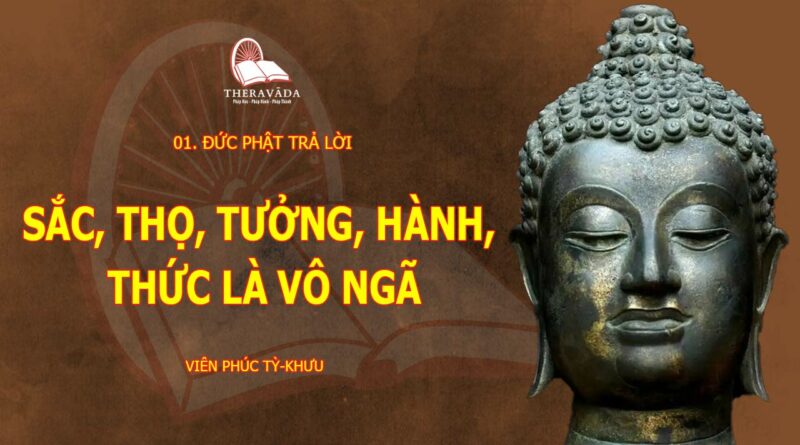
Sắc, thọ, tưởng, hành, thức là vô ngã, vậy những hành động do vô ngã làm đã được ngã nào cảm thọ kết quả?
– Này các Tỷ-kheo, sự kiện này xảy ra, khi ở đây có kẻ ngu si, vô tri, vô minh, với tâm bị tham dục chi phối, lại nghĩ cần phải vượt qua lời dạy của bậc Ðạo sư với câu hỏi: “Nếu được nói rằng, chư Tôn giả, sắc , thọ, tưởng, hành, thức là vô ngã, vậy những hành động do vô ngã làm đã được ngã nào cảm thọ kết quả?”
– Này các Tỷ-kheo, các Ông đã được Ta huấn luyện tìm kiếm nhân duyên, chỗ này chỗ kia, đối với những pháp này, pháp khác. Các Ông nghĩ thế nào, này các Tỷ-kheo, sắc [thọ, tưởng, hành, thức] là thường hay vô thường?
– Vô thường, bạch Thế Tôn.
– Những gì vô thường là khổ hay lạc?
– Là khổ, bạch Thế Tôn.
– Những gì vô thường, khổ, bị biến hoại, có hợp lý chăng khi xem: “Cái này của tôi, cái này là tôi, cái này là tự ngã của tôi?”
– Thưa không vậy, bạch Thế Tôn.
– Do vậy, này các Tỷ-kheo, phàm có sắc [thọ, tưởng, hành, thức] gì, quá khứ, vị lai hay hiện tại, nội hay ngoại, thô hay tế, liệt hay thắng, xa hay gần, đối với tất cả sắc [thọ, tưởng, hành, thức], thấy được như thật với trí tuệ là:
"Cái này không phải của tôi, cái này không phải là tôi, cái này không phải tự ngã của tôi".
Như vậy, này các Tỷ-kheo, vị Ða văn Thánh đệ tử yếm ly đối với sắc, yếm ly đối với thọ, yếm ly đối với tưởng, yếm ly đối với hành, yếm ly đối với thức.
Do yếm ly nên ly tham, do ly tham nên được giải thoát. Trong sự giải thoát, vị ấy biết được vị ấy đã giải thoát. Vị ấy biết: “Sanh đã tận, Phạm hạnh đã thành, những gì nên làm đã làm. Từ nay không còn trở lại đời sống thế này nữa”.
Thế Tôn thuyết giảng như vậy. Các Tỷ-kheo ấy hoan hỷ tín thọ lời Thế Tôn dạy. Trong khi sự giảng giải này được nói lên, tâm của sáu mươi vị Tỷ-kheo được giải thoát khỏi các lậu hoặc, không có chấp thủ.
‘Bhikkhus, there is a possibility that a certain foolish man overcome by ignorance and falling for craving, should think to creep through the Dispensation of the Teacher, thinking, “Indeed, then matter is void of self, feelings are void of self, perceptions are void of self, determinations are void of self and consciousness is void of self. How could the self be touched, by actions, done void of a self?” Bhikkhus, I train you for conditionality, according to the arisen situation, in this and other instance. Is matter permanent or impermanent?’
‘Venerable sir, impermanent’
‘That which is impermanent, is it unpleasant or pleasant?’
‘Venerable sir, unpleasant.’
‘That which is impermanent, unpleasant, a changing thing is it suitable to reflect, It is mine, I’m that, it is my self?’
‘No venerable sir, it is not suitable.’
‘Are feelings,….re….. perceptions, …re…. determinations, …re….. is consciousness permanent or impermanent?’
‘Venerable sir, impermanent’
‘That which is impermanent, is it unpleasant or pleasant?’
‘Venerable sir, unpleasant.’
‘That which is impermanent, unpleasant, a changing thing is it suitable to reflect, It is mine, I’m that, it is my self?’
‘No venerable sir, it is not suitable.’
‘Therefore bhikkhus, all matter, coarse or fine, internal or external, in the past, future and the present, inferior or superior, far or near, I’m not all that matter, it is not my self. All feelings, coarse or fine, internal or external, in the past, future and the present, inferior or superior, far or near, I’m not all those feelings, they are not my self. All perceptions, coarse or fine internal or external in the past, future and the present, inferior or superior, far or near, I’m not all those perceptions, they are not my self. All determinations, coarse or fine, internal or external, in the past, future and the present, inferior or superior, far or near, I’m not all those determinations, they are not my self. All consciousness, coarse or fine internal or external, in the past, future and the present, inferior or superior, far or near, I’m not that consciousess, it is not my self. This should be seen with right wisdom, as it really is.
Bhikkhus, when the learned noble disciple sees this, he turns away from matter, turns away from feelings, turns away from perceptions, turns away from determinations and turns away from consciousness. Turning away is detached and released. When released, knowledge arises, I’m released. Birth is destroyed, the holy life is lived, what should be done is done, there is nothing more to wish.’
The Blessed One said thus, and those bhikkhus delighted in the words of the Blessed One.
When this discourse was given about sixty bhikkhus were released from desires without holdings.
Nguồn trích dẫn: Trung Bộ Kinh – Majjhima Nikaya, M109: Ðại kinh Mãn nguyệt – Mahàpunnama sutta. TK Viên Phúc hiệu đính và lược dịch theo bản dịch HT Thích Minh Châu.
Majjhima Nikaya, M109: Mahàpunnama sutta.


